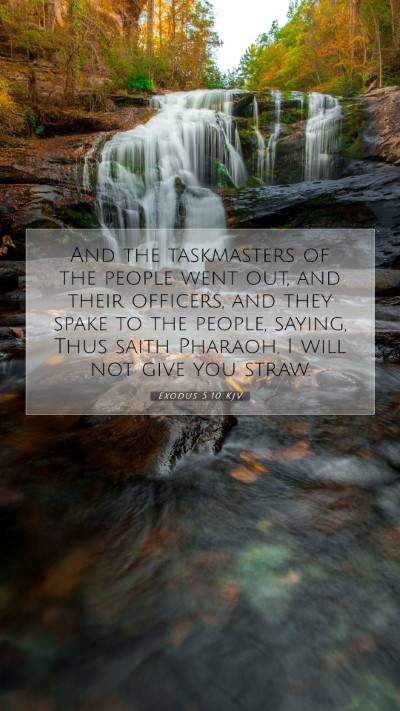Understanding Exodus 5:10 - A Comprehensive Bible Verse Commentary
Exodus 5:10 states, "And the taskmasters of the people went out, and their officers, and they spake to the people, saying, Thus saith Pharaoh, I will not give you straw." This verse marks a challenging moment for the Israelites during their enslavement in Egypt, reflecting on the themes of oppression, faith, and divine deliverance.
Verse Meaning Overview
The meaning of this Bible verse can be derived from several public domain commentaries, including those by Matthew Henry, Albert Barnes, and Adam Clarke. Each of these scholars brings forth critical insights into the historical and spiritual implications of the passage.
Matthew Henry's Commentary
Henry emphasizes the adverse conditions the Israelites faced under Pharaoh's rule and the increasing burden imposed by the Egyptian taskmasters. He highlights how Pharaoh's refusal to provide straw for bricks was symbolic of his hardened heart and disregard for the suffering of the Israelites. This act not only increased their labor but also served to test their faith and resilience.
Albert Barnes' Commentary
Barnes points out that the instruction from Pharaoh represents a pivotal moment intended to demoralize the Israelite workers. By withholding straw and demanding the same quota of bricks, Pharaoh sought to suppress the people's hope of liberation. Barnes notes that this was a psychological tactic to instill fear and despair among the Israelites, further entrenching them in servitude.
Adam Clarke's Commentary
Clarke discusses the significance of the taskmasters and their role in enforcing Pharaoh's decree. He mentions that the officers were Egyptian supervisors who had authority over the Israelites. Clarke also delves into the historical context, explaining how such tactics were common in ancient Egyptian rule as a means of maintaining control over subjugated peoples.
Key Themes in Exodus 5:10
- Oppression and Hardship: The demand for bricks without straw illustrates the brutal treatment of the Israelites and symbolizes broader themes of injustice.
- Faith Under Trial: This verse serves as a testament to the faith of God's people amid adversity, setting the stage for their eventual deliverance.
- Divine Sovereignty: The events foreshadow God's impending intervention in Egyptian society, showcasing His power to deliver His people.
Historical Context
Understanding Scripture involves delving into the historical context of the verse. At this time, the Israelites were subject to forced labor, and Pharaoh's oppressive policies reflected the broader political climate of ancient Egypt, where slaves were often used to build monuments, cities, and projects to enhance the Pharaoh's glory.
Cross References
For deeper insights, consider these additional Bible cross-references:
- Exodus 1:13-14: Describes the harsh treatment of the Israelites by the Egyptians.
- Exodus 3:7-10: God's promise to Moses for the deliverance of the Israelites.
- Exodus 12:31-32: The eventual release of the Israelites from bondage following the plagues.
Application of Exodus 5:10
This verse can be applied to our lives today, reminding us that even in times of relentless hardship and oppression, maintaining faith is crucial. It encourages contemporary believers to rely on God during struggles and to trust in His timing and deliverance, as He ultimately has the power to change our circumstances.
Conclusion
Exodus 5:10 serves as a profound reminder of the trials faced by the Israelites and the ultimate power of faith in the face of adversity. Engaging with the Bible verse meanings, interpretations, and commentaries leads to a deeper understanding of Scripture and encourages believers to explore the historical context and significance of key passages.
Engage in Bible Study
To further your exploration of biblical exegesis, consider participating in bible study groups, utilizing bible study tools, or enrolling in bible study courses that will enable you to delve deeper into the Word and understand the significance of verses like Exodus 5:10.


